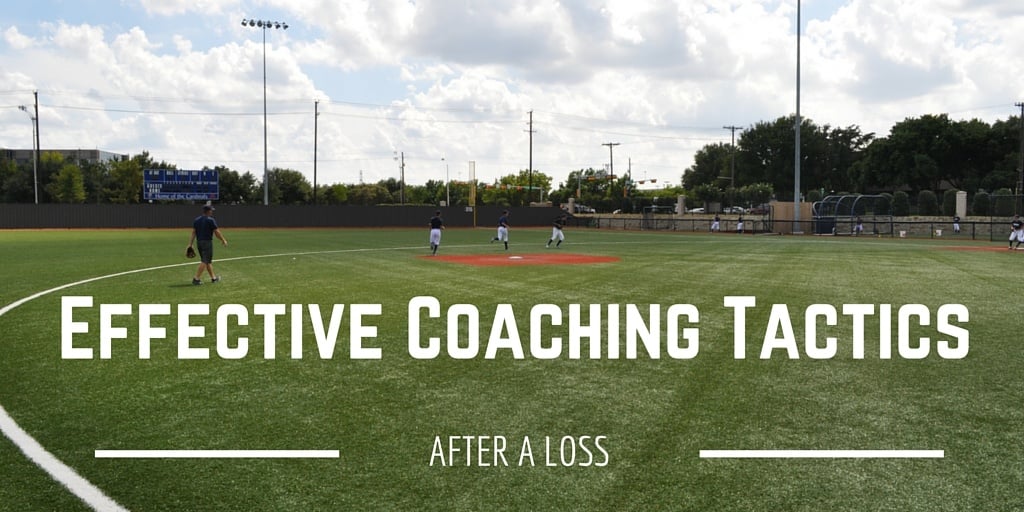1.) Take ownership.
Look to yourself first. Don't beat yourself up, but if you made some bad calls and moves, be man enough to admit it. In Harvard Business Review's "Why Good Leaders Pass the Credit and Take the Blame," researchers found that the leaders who took ownership of slumps and stayed the course were the leaders who successfully navigated turnarounds for their companies.
Being honest about personal coaching mistakes brings about greater respect from your players.
2.) Objectively measure the team's performance and energy.
The old adage: Good pitching beats good hitting is true. If a pitcher's on his A game, chances are he's gonna beat the hitters. They may have hustled hard, but got outplayed.
It is important here to emphasize that the coach must celebrate what went right in his team, even if they come out losing. Your team may have gone out swinging, but the hustled effort and passion must be acknowledged in order to pick up, dust off, and get ready for the next one.
Dr. Alan Goldberg's Competitive Advantage: Peak Performance and Overcoming Sports Fears and Blocks covers the topic of effectively motivating your players. Some of his standout tips include:
- DO NOT EQUATE YOUR ATHLETES' SELF-WORTH WITH THEIR PERFORMANCES
Bad performances don't mean bad people. Let your athlete know that you are even more there for them when they have a bad performance than when they have a good one. Don't be a fair weather fan to your athletes! - HANDLE FAILURES AND MISTAKES CONSTRUCTIVELY
Teach your athletes that failures and setbacks are a necessary part of the learning process and not a cause for embarrassment or quitting. Model this attitude and you'll motivate your athletes to take risks and really go for it. If you jump in an athlete's face whenever he messes up you'll demotivate him and get him worrying about failing. (source)
3.) Dissect the loss without casting blame.
Great coaches have the ability to assess areas of strength and weakness without villian-izing anyone. The season is not one game, it's a process.
Lem Elway's "Lessons in Losing" has some awesome points on how to navigate the analysis and implementation of improving after a loss:
- Keep the confidence of your players and parents: Constantly evaluate why the team lost and try to turn things around.
- Break down every game and figure out what went wrong and what went right. Know what your athletes are doing well and what they need to improve on. Are there problems with concentration, technical skills, or communication? Have you neglected to teach them something? What will you do in practice to work on those problems?
- I use statistics and performance analysis to find areas that need improvement. I am a firm believer in the motto, “A chain is only as strong as its weakest link,” and when we’re losing, I ask myself if there is a weak link in our offense or defense. Then, I work with those athletes to improve their skills, or I increase the number of athletes working at the position so I can make a change if necessary. Either the athlete gets better or I alter the lineup.
- Be transparent about your decisions: Throughout all these evaluations, I make sure I am communicating well. After games, I talk to players about what caused the team to lose and what we need to do to improve. I post production sheets on the locker room bulletin board so my athletes can see the facts of their performance, and I let them know that I am evaluating them on their hustle, teamwork, and attitude. (source)
4.) How about the plan?
When it's time to hit the field again, what's the strategy? Tomorrow you'll need to present something in practice whether it's carry on as usual or making adjustments. Don't be emotional when identifying the areas that need work; the last thing players need after a loss is a hammer of a coach.
Knowing what you can and can't control in your planning process is key for both coach and player. Empowering your players after a loss with what they can do, just might be the most sure way to snap them out of the losing mindset.
Baseball Excellence: "Techniques For Coaching Success" covers the elements of the game you can and can't control that are worth mentioning in light of developing your plan of action and empowering your players.
|
No Control: |
Can Control: |
| 1. Winning the game | 1. Work Ethic |
| 2. Hitters' hits | 2. Practice habits |
| 3. Teammate's errors | 3. Attitude |
| 4. Umpires's Calls | 4. Developing mental toughness |
| 5. Crowd noise | 5. Ability to focus developed through sound practices |
| 6. Weather/Playing conditions | 6. Desire |
| 7. The play of the opponents |
Reminding your players of what they can and can't control will allow them to focus on the variables most important to them: the things they CAN control.
For needed encouragement to the coach, Lem Elway offers some sound advice on perspective for making new practice plans and staying focused on what you are about:
The first step to take when you start losing is to review your coaching philosophy. If you have a written philosophy, re-read it. It will help remind you why you coach, and for most of us, it’s not only about winning. Staying true to your coaching philosophy is paramount to keeping the situation positive. (source)
Confidently executing a plan, whatever it may be, gives your players reason to be confident in their coach and their ability to recover from a disappointment.
5.) Don't Get Lost in Your Loss.
It's important that everyone who decides to play the game of baseball realizes that at the end of the day, there's going to be another day. Everything counts and matters, but after it's over, you have to regroup and fight another day.
Still not convinced? Take it from the greats delivering tried and true baseball altruism:
- "Every day is a new opportunity. You can build on yesterday's success or put its failures behind and start over again. That's the way life is, with a new game every day, and that's the way baseball is." ― Bob Feller
- "Baseball is the only field of endeavor where a man can succeed three times out of ten and be considered a good performer." ― Ted Williams
- “Every strike brings me closer to the next home run.” ― Babe Ruth
-
“I have always felt that although someone may defeat me, and I strike out in a ball game, the pitcher on the particular day was the best player. But I know when I see him again, I'm going to be ready for his curve ball. Failure is a part of success. There is no such thing as a bed of roses all your life. But failure will never stand in the way of success if you learn from it.” ― Hank Aaron
Don't get lost in your loss. There's work to be done, room to get better, and games to be won.
Thanks for reading! Have some stories of your own? Please share your experience with us in the comments section. Want more tips and strategies for coaching? Check out 8 Baseball Practice Secrets For the Coach Who Wins Championships or Top 5 Books to Add To Your Locker Room This Season.



![Abandoning the One-Size-Fits-All Approach [Coaches Forum Footnotes] Abandoning the One-Size-Fits-All Approach [Coaches Forum Footnotes]](https://info.fungoman.com/hs-fs/hubfs/Abandoning%20One-Size-Fits-All%20Approach%20with%20Don%20Wakamatsu.png?width=324&height=160&name=Abandoning%20One-Size-Fits-All%20Approach%20with%20Don%20Wakamatsu.png)


Leave a Comment